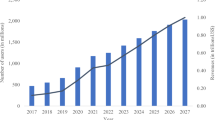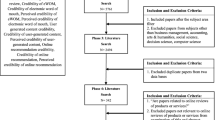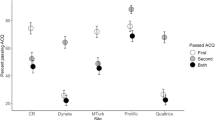Abstract
Although online reverse commerce (recommerce) is convenient and efficient, it is not without caveats. It limits recommerce firms’ flexibility to offer personalized prices and may cause mismatched grading between the firms and sellers of used products. This study examines a recommerce firm’s decision on grading criteria and prices. We find that the firm’s optimal policy exhibits two distinctly different patterns depending on the trade value of the product. We demonstrate that sellers’ overestimate and underestimate errors have qualitatively different effects on firm profitability, and the effects crucially rely on the type of optimal policy. These findings can apprise firms on how to preset sorting criteria and prices as well as reduce grading errors.
Similar content being viewed by others
References
Agrawal S, Singh RK, Murtaza Q (2015). A literature review and perspectives in reverse logistics. Resources, Conservation and Recycling 97:76–92.
Anderson ET, Hansen K, Simester D (2009). The option value of returns: Theory and empirical evidence. Marketing Science 28(3):405–423.
Chu X, Zhong Q, Li X (2018). Reverse channel selection decisions with a joint third-party recycler. International Journal of Production Research 56(18):5969–5981.
Denizel M, Ferguson M, Souza GC (2010). Multiperiod remanufacturing planning with uncertain quality of inputs. IEEE Transactions on Engineering Management 57(3):394–404.
Esenduran G, Hill JA, Noh IJ (2020). Understanding the choice of online resale channel for used electronics. Production and Operations Management 29(5):1188–1211.
Ferguson M, Guide VD, Koca E, Souza GC (2009). The value of quality grading in remanufacturing. Production and Operations Management 18(3):300–314.
Ferguson M, Guide VD, Souza GC (2006). Supply chain coordination for false failure returns. Manufacturing & Service Operations Management 8(4):376–393.
Fu Y, Liu G, Papadimitriou S, Xiong H, Li X, Chen G (2016). Fused latent models for assessing product return propensity in online commerce. Decision Support Systems 91:77–88.
Galbreth MR, Blackburn JD (2006). Optimal acquisition and sorting policies for remanufacturing. Production and Operations Management 15(3):384–392.
Galbreth MR, Blackburn JD (2010). Optimal acquisition quantities in remanufacturing with condition uncertainty. Production and Operations Management 19(1):61–69.
Gu Q, Tagaras G (2014). Optimal collection and remanufacturing decisions in reverse supply chains with collector’s imperfect sorting. International Journal of Production Research 52(17):5155–5170.
Guide VD, Teunter RH, Van Wassenhove L (2003). Matching demand and supply to maximize profits from remanufacturing. International Journal of Production Research 5(4):303–316.
Gunes ED, Souza GC, Van Wassenhove L (2006). The optimal disposition decision for product returns. Operations Management Research 1(1):6–14.
Hahler S, Fleischmann M (2013). The value of acquisition price differentiation in reverse logistics. Journal of Business Economics 83(1):1–28.
Hahler S, Fleischmann M (2017). Strategic grading in the product acquisition process of a reverse supply chain. Production and Operations Management 26(8):1498–1511.
Hsiao L, Chen YJ (2012). Returns policy and quality risk in e-business. Production and Operations Management 21(3):489–503.
Itoh M (1983). Monopoly, product differentiation and economic welfare. Journal of Economic Theory 31(1):88–104.
Li C, Feng L, Luo S (2019). Strategic introduction of an online recycling channel in the reverse supply chain with a random demand. Journal of Cleaner Production 236:117683.
Mussa M, Rosen S (1978). Monopoly and product quality. Journal of Economic Theory 18(2):301–317.
Mutha A, Bansal S, Guide VD (2016). Managing demand uncertainty through core acquisition in remanufacturing. Production and Operations Management 25(8):1449–1464.
Ofek E, Katona Z, Sarvary M (2011). “Bricks and Clicks”: The impact of product returns on the strategies of multichannel retailers. Marketing Science 30(1):42–60.
Panagiotidou S, Nenes G, Zikopoulos C (2013). Optimal procurement and sampling decisions under stochastic yield of returns in reverse supply chains. OR Spectrum 35:1–32.
Robotis A, Boyaci T, Verter V (2012). Investing in reusability of products of uncertain remanufacturing cost: The role of inspection capabilities. International Journal Production Economics 140(1):385–395.
Simpson D, Power D, Riach K, Tsarenko Y (2019). Consumer motivation for product disposal and its role in acquiring products for reuse. Journal of Operations Management 65(7):612–635.
StEP (2020). Partnerships between the informal and the formal sector for sustainable e-waste management. http://www.step-initiative.org/publications.html.
Sujan M (1985). Consumer knowledge:Effects on evaluation strategies mediating consumer judgments. Journal of Consumer Research 12(1):31–46.
Swinney R (2011). Selling to strategic consumers when product value is uncertain: The value of matching supply and demand. Management Science 57(10):1737–1751.
Tagaras G, Zikopoulos C (2008). Optimal location and value of timely sorting of used items in a remanufacturing supply chain with multiple collection sites. International Journal Production Economics 115(2):424–432.
Teunter RH, Flapper SDP (2011). Optimal core acquisition and remanufacturing policies under uncertain core quality fractions. European Journal of Operational Research 210(2):241–248.
Tozanlı O, Kongar E, Gupta MS (2020). Evaluation of waste electronic product trade-in strategies in predictive twin disassembly systems in the era of blockchain. Sustainability 12:5416.
Van Wassenhove L, Zikopoulos C (2010). On the effect of quality overestimation in remanufacturing. International Journal of Production Research 48(18):5263–5280.
Walsh G, Albrecht AK, Kunz W, Hofacker CF (2016). Relationship between online retailers’ reputation and product returns. British Journal of Management 27(1):3–20.
Wei S, Tang O, Sundin E (2015). Core (product) acquisition management for remanufacturing: A review. Journal of Remanufacturing 5(4):1–27.
Xiao Y, Zhou SX (2020). Trade-in for cash or for upgrade? Dynamic pricing with customer choice. Production and Operations Management 29(4):856–881.
Zhao FL (2013). Aihuishou: collector in the era of fast moving phone consumption. http://finance.sina.com.cn/roll/20130105/080814189895.shtml.
Zhou SX, Tao Z, Chao X (2011). Optimal control of inventory systems with multiple types of remanufacturable products. Manufacturing & Service Operations Management 13(1):20–34.
Zhou SX, Yu Y (2011). Optimal product acquisition, pricing, and inventory management for systems with remanufacturing. Operations Research 59(2):514–521.
Zikopoulos C, Tagaras G (2007). Impact of uncertainty in the quality of returns on the profitability of a single-period refurbishing operatio. European Journal of Operational Research 182(1):205–225.
Acknowledgments
This work was supported by the National Natural Science Foundation of China under Grant Nos.71802037 and 71490723.
Author information
Authors and Affiliations
Corresponding author
Additional information
Xiang Chu received the B.Sc. and M.Sc. degrees in mathematics from Dalian University of Technology in 2006 and 2008, and the Ph.D. degree in management information system from the same university in 2015. He is an associate professor of management science and engineering at Dalian Maritime University. His major research interests include logistics and supply chain management.
Zhong Wen received Ph.D. degree in information systems in 2007 from New York University. He is an associate professor of management science and engineering at Beiing Foreign Studies University. Currently his major research interests include e-markets, e-commerce, and green supply chains.
Jian Chen is Lenovo Chair Professor and Chairman of Management Science Department, Director of Research Center for Contemporary Management, Tsinghua University. He received the B.Sc. degree in electrical engineering from Tsinghua University, Beijing, China, in 1983, and the M.Sc. and the Ph.D. degree both in systems engineering from the same University in 1986 and 1989, respectively. His main research interests include supply chain management, E-commerce, decision support systems. Dr. Chen has published over 200 papers in refereed journals and has been a principal investigator for about 50 grants or research contracts with National Science Foundation of China, governmental organizations and companies. He has been invited to present several plenary lectures at international conferences. He has also been elected to IEEE Fellow. He also serves/served as editor/area editor/associate editor/editorial board member for many international journals.
Rights and permissions
About this article
Cite this article
Chu, X., Wen, Z. & Chen, J. Optimal Grading Policies in the Online Acquisition of Used Products. J. Syst. Sci. Syst. Eng. 30, 29–43 (2021). https://doi.org/10.1007/s11518-021-5479-3
Published:
Issue Date:
DOI: https://doi.org/10.1007/s11518-021-5479-3




